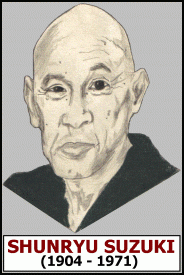Šunrjú Suzuki citáty a výroky
Šunrjú Suzuki: Citáty v angličtine
Sun-Faced Buddha, Moon-Faced Buddha lecture at the Zen Mountain Center (17 August 1971) http://suzukiroshi.sfzc.org/archives/index.cgi/710817V.html
Kontext: Communication is — start by understanding — your own understanding about people. Even though you want them to understand you, you know, it is — unless you understand people, it is almost impossible. Don't you think so? Only when you understand people, they may understand you. So even though you do not say anything, if you understand people there is some communication.
“In the beginner's mind there are many possibilities, in the expert's there are few.”
Prologue
Zen Mind, Beginner's Mind (1973)
Varianta: In the beginner’s mind there are many possibilities, but in the expert’s there are few
Zdroj: Zen Mind, Beginner's Mind: Informal Talks on Zen Meditation and Practice
Lecture in Los Altos, CA (1 September 1967)
Kontext: So I say, ‘Oh, I am sorry but soon you will see the bright sunrise every morning and beautiful sunset in the evening, every evening, but right now perhaps you…under your situation it may be impossible to see the beautiful sunset or bright sunrise, or beautiful flower in your garden, and it is impossible to take care of your garden, but soon you will see the beauty of the flowers and you will cut some flowers for your room.’ When you start to do this kind of thing you are alright. Don’t worry a bit. It means when you become you, yourself, and when you see things as they are, and when you become at one with your surrounding, in its true sense, there is true self.
"Three Lecture Excerpts from Shunryu Suzuki Roshi" http://www.berkeleyzencenter.org/Lectures/may2000.shtml in Newsletter (May 2000)
Kontext: You may say you attained some stage in your practice. But that is just a trivial event in your long life. It is like saying the ocean is round, or like a jewel, or palace. For a hungry ghost the ocean is a pool of blood; for a dragon the ocean is a palace; for a fish it is his house; for a human being it is water. There must be various understandings. When the ocean is a palace, it is a palace. You cannot say it is not a palace. For a dragon it is actually a palace. If you laugh at a fish who says it is a palace, Buddha will laugh at you who say it is two o'clock, three o'clock. It is the same thing.
Lecture in Los Altos, CA (1 September 1967)
Kontext: So it is not a matter of whether it is possible to attain Buddhahood, or if it is possible to make a tile a jewel. But just to work, just to live in this world with this understanding is the most important point, and that is our practice. That is true zazen.
Lecture in Los Altos, CA (1 September 1967) http://www.shunryusuzuki.com/suzuki/transcripts-pdf/67-pdf/67-08-31U.pdf
Kontext: What is true zazen? What do you mean by Zen becomes Zen and you become you? You become you is a very important point. You become you. When you become you, even though you are in bed, you may not be you most of the time. Even though you are sitting here, I wonder whether you are you in its true sense. So to be you is zazen.
“Treat every moment as your last. It is not preparation for something else.”
Zdroj: Zen Mind, Beginner's Mind: Informal Talks on Zen Meditation and Practice
Zdroj: Zen Is Right Here: Teaching Stories and Anecdotes of Shunryu Suzuki, Author of "ZEN Mind, Beginner's Mind"
“Nothing we see or hear is perfect. But right there in the imperfection is perfect reality.”
Wherever You Are, Enlightenment Is There (page127)
Not Always So, practicing the true spirit of Zen (2002)
Zdroj: Zen Mind, Beginner's Mind: Informal Talks on Zen Meditation and Practice
“What we call "I" is just a swinging door which moves when we inhale and when we exhale.”
Zdroj: Zen Mind, Beginner's Mind: Informal Talks on Zen Meditation and Practice
“We do not exist for the sake of something else. We exist for the sake of ourselves.”
Zdroj: Zen Mind, Beginner's Mind: Informal Talks on Zen Meditation and Practice
“When something dies is the greatest teaching.”
Zdroj: Zen Mind, Beginner's Mind: Informal Talks on Zen Meditation and Practice
Zdroj: Zen Mind, Beginner's Mind: Informal Talks on Zen Meditation and Practice
Zdroj: Zen Mind, Beginner's Mind: Informal Talks on Zen Meditation and Practice
“Time goes from present to past.”
Zdroj: Zen Mind, Beginner's Mind: Informal Talks on Zen Meditation and Practice
Part 4, No. 1. "Transiency"
Zen Mind, Beginner's Mind (1973)
Pt. 1 : Right Practice, "Bowing"
Zen Mind, Beginner's Mind (1973)
Express Yourself Fully (page 8)
Not Always So, practicing the true spirit of Zen (2002)
Pt. 3 : Right Understanding, "Naturalness"
Zen Mind, Beginner's Mind (1973)
Part 3, No. 3 "Study Yourself"
Zen Mind, Beginner's Mind (1973)
“There are, strictly speaking, no enlightened people, there is only enlightened activity.”
Quoted in Zen Millionaire : The Investor's Guide to the "Other Side" (2007) by Paul B. Farrell
Varianta: Strictly speaking, there are no enlightened people, there is only enlightened activity.
"I don't know" is the First Principle.
Lotus Sutra No. 6 lecture at the Zen Mountain Center (February 1968) http://www.cuke.com/Cucumber%20Project/lectures/transcripts-new-2012/srl-68-02-00F-f.html
Letters From Emptiness (page 33)
Not Always So, practicing the true spirit of Zen (2002)
